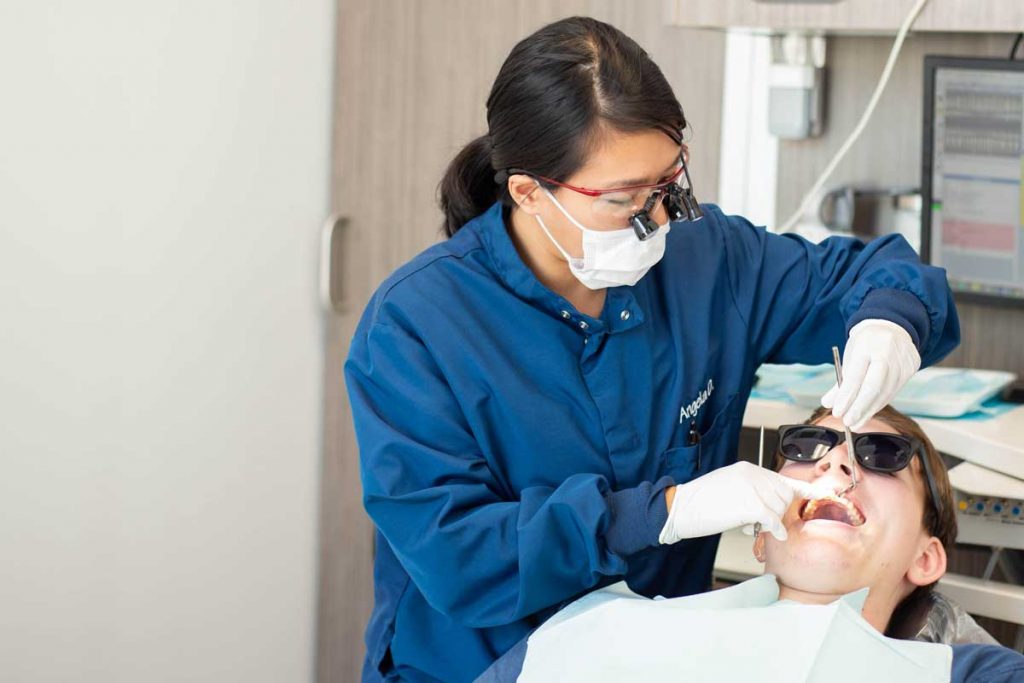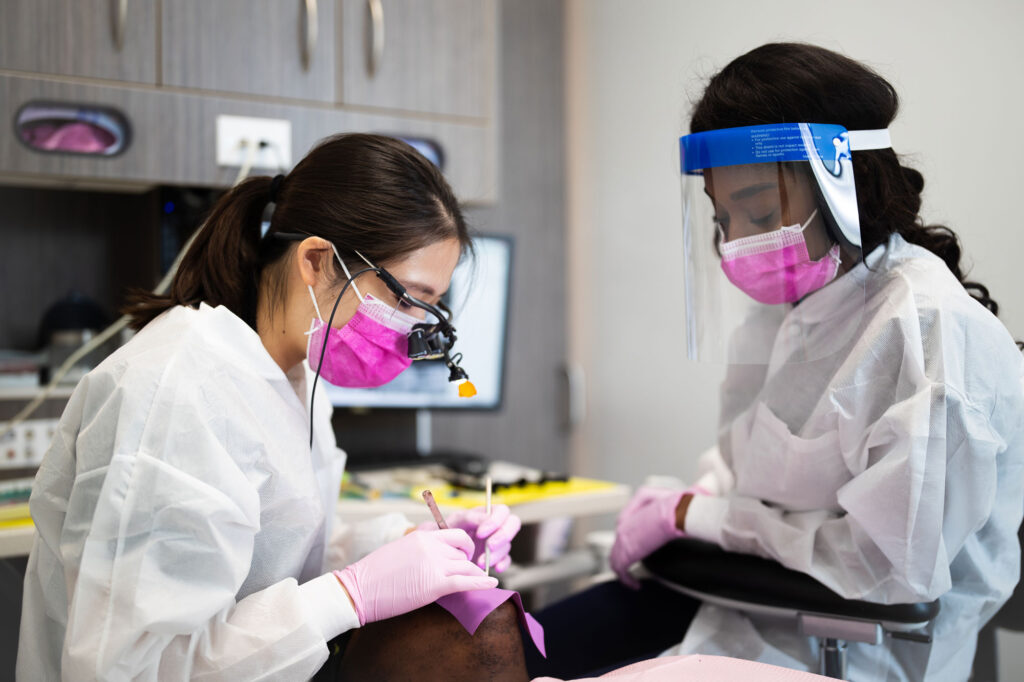Periodontal Disease Treatments and Procedures
Periodontal specialists have several advanced periodontal treatments to deal with all stages of gum disease. However, the periodontal treatments also depend on the patient’s overall health and the current stage of gum disease. The periodontal dentist first thoroughly evaluate the condition, then recommend the correct treatment mode. Normally, the professionals recommend the treatments: periodontal surgery, non-Surgical Treatment, dental Implant procedures, and cosmetic Procedures.
Comprehensive Houston Dental Care
Caring for your smile means providing high-quality dental care that meets all of your dental needs. Our Houston dental care services are comprehensive, which means from a routine cleaning to a complex smile makeover, we can give you the care you need. The URBN Dental team is well-versed in a wide variety of dental treatments to help our patients get beautiful, healthy smiles. All major insurances accepted, including medicare.
Call to schedule an appointment at 346-512-4902
What is Periodontal Disease?
If your gums become infected with bacteria and spread, it can destroy your teeth. The structures that support the teeth’s connection to the jawbone deteriorate to the point where your loosened teeth must be extracted.
The supporting structures affected by advanced periodontal disease treatments include the gums, cementum that covers the root, the alveolar bone, and periodontal ligament. In the earliest stages of the disease, only your gums are affected. As the disease goes untreated, it can affect all of these structures.
Call to schedule an appointment at 346-512-4902

How is periodontal disease treated?
Dr. Chae treats periodontal disease treatment by getting at the infection that’s crept underneath the gum line. If caught early enough, he can reverse it. Once bacteria has reached this point, even good at-home oral hygiene practices can’t reach it.
If you have advanced periodontist Houston, they use a state-of-the-art laser made by Biolase to reach plaque and bacteria below the gum line. It’s a minimally invasive way to remove inflamed tissue and plaque deposits while preparing the pocket and surface of the tooth for healing.
FAQs about PERIODONTAL DISEASE
Periodontal disease doesn’t just affect your teeth. It may also play a role in aggravating health conditions in the rest of your body. These include:
- Heart disease and stroke
- Diabetes
- Respiratory disease
- Premature births
Don’t miss the signs of gum disease:
- Red, swollen, or inflamed gums
- Bleeding when you floss or brush
- Gums that are receding or pulling away from teeth
- Change in bite
- Loose teeth
- Mouth sores
- Chronic bad breath or a metallic taste in mouth
The dental plaque that forms on your teeth carry bacteria. If your at-home dental hygiene habits fail to get rid of this bacteria, it can irritate your gums and lead to infection.
Bleeding while brushing or flossing or swollen gums indicates you have gingivitis, the earliest stage of periodontal disease. It’s imperative that you amp up your oral hygiene care and visit Dr. Bidget Espagnol for a thorough cleaning if you experience those symptoms.
You can benefit from Periodontal Treatments and Procedures once every six months but may need them more often if you have gingivitis or a further progression of periodontal disease.
Call to schedule an appointment at 346-512-4902
TESTIMONIALS
Consequences – Treatment – Prevent
Periodontist Houston is extremely risky and dangerous gum disease, and it can lead to numerous complications if you don’t treat it in time or resist periodontal disease treatment.
First, the periodontal infection will spread into your gums and bones, leading to complete loss of teeth and decay. This can progress so far that you must opt for complex surgical treatments like root canal treatment or complete dental extraction.
Periodontal infection and bacteria can also spread into your bloodstream, putting you at risk of other diseases related to the heart, lungs, etc. This may also lead to coronary artery disease, arthritis, etc. As such, it’s crucial to treat periodontal gum disease as fast as possible.
Periodontitis is a dangerous disease, and the periodontal infection spreads rapidly, so you need to take action the moment you notice any periodontal gum disease symptoms mentioned earlier. If your gum disease has progressed to periodontitis, it’s already a clear indication that you didn’t consult a dentist when you first noticed the signs of gingivitis. However, you can still consult a dentist and save your teeth from complete decay.
The periodontal disease treatment begins with a thorough clinical examination. The dental hygienist first examines your teeth and gums to detect the signs of gum disease. Periodontitis is that stage of gum disease in which the bones underneath your gums start rotting and decaying. The dentist needs to run x-ray scans to detect how far the damage has spread into your bones and teeth. The x-ray will also help doctors detect the wide gap between your gums and teeth.
When the periodontal disease treatment begins, the dental hygienist cleans out the gum pockets to stop the periodontal infection from spreading further. If periodontal disease hasn’t progressed too far into the bones, the teeth can still be saved using minimally invasive procedures like scaling and root planing.
Scaling is a simple procedure in which the doctor uses a scalar tool to scrape off all the accumulated plaque and tartar from the teeth and the gum line. Root planing is when the dentist cleans the infected tooth’s root to reattach it to the receding gum line. This eliminates the risk of further periodontal infection and closes the teeth-gum gap caused by the bacteria.
However, if your periodontal disease has spread considerably, the aforementioned procedures will be rendered useless. In that case, you’ll need to opt for corrective surgical periodontitis treatment. This, however, is a last-resort scenario and should only be tried if it’s too late for non-invasive periodontitis treatment. That’s primarily why it’s so important to consular a doctor when you first notice the initial warning signs of gum disease.
Periodontitis can be prevented completely, but only if you’re careful and follow all of the following good oral hygiene tips:
- Brush your teeth twice a day using a dentist-recommended toothpaste.
- Floss your teeth regularly to remove all particles of food stuck between your teeth.
- Rinse your mouth with an antibacterial mouthwash regularly.
- Visit the dentist for a deep cleaning appointment every 3 to 6 months in order to remove all accumulated plaque and tartar.
- Don’t eat too many chocolates and sweets as they attract bacteria and lead to periodontal infection.
- Stop smoking.
- Visit the dentist as soon as you see any signs of gum disease.
Call to schedule an appointment at 346-512-4902
Periodontal Disease Treatment | Dental Clinic in Uptown Houston
Periodontal Disease Treatment Stages
Most people don’t realize they have a problem with their gums until their dentist points it out. But by then, you may already have gum disease or periodontitis. Periodontitis is a serious inflammatory condition that can destroy the gums and the bone that support your teeth. Your teeth may eventually become loose and have to be removed. Periodontal disease is treated in four stages — professional cleaning, scaling & root planing, periodontal surgery, and ongoing oral health and prevention.
Call to schedule an appointment at 346-512-4902

Professional Cleaning
A professional cleaning, also called prophylaxis, is the first stage of treatment. During a professional cleaning, your dentist or dental hygienist removes plaque and tartar from above and below the gum line of all your teeth.
Scaling & Root Planing
Scaling and root planing is a deep-cleaning, non-surgical procedure. It is often recommended for treating periodontitis. During scaling, plaque and tartar are removed from above and below the gum line. Root planing cleans the roots of your teeth and rough spots are smoothed out to prevent plaque from collecting again.
Periodontal Surgery
In some cases, periodontal surgery may be necessary. There are a few different types of periodontal surgery, all of which are meant to reduce pockets of bacteria below the gumline and promote the reattachment of healthy gum tissue to the teeth. The type of surgery that is right for you will depend on the severity of your disease and how far it has progressed.
Ongoing Oral Health
Once periodontitis has been successfully treated, it’s important to maintain good oral hygiene habits to prevent the disease from coming back. This means brushing and flossing regularly, eating a healthy diet, and visiting your dentist for regular cleanings and checkups.
Regular dental cleanings are necessary after periodontal disease treatment | Periodontal dentist
According to the Centers for Disease Control and Prevention (CDC), regular dental cleanings are necessary after periodontal disease treatment to help prevent the disease from coming back. The CDC recommends that people with periodontal disease get their teeth cleaned at least twice a year.
The best way to prevent periodontal disease is to brush and floss your teeth every day and to see your dentist for regular checkups and cleanings. If you have periodontal disease, your dentist will work with you to develop a treatment plan. This may include more frequent cleanings, special mouth rinses, and/or antibiotics.
You will need dental cleanings from a gum specialist dentist more often
You will need dental cleanings more often after periodontal treatment because the treated area is more susceptible to plaque build-up. Depending on the severity of your condition, you may need to have your teeth cleaned every three to six months. Additionally, it is important to brush and floss carefully and regularly to maintain the health of your gums.
During cleanings, your dental professional will remove any built-up plaque and tartar on your teeth. They will also check to make sure your gums are healthy and free of disease. If they see any signs of periodontal disease, they can treat it before it becomes a bigger problem again.
Tips to maintain optimal oral hygiene at home:
- Use a soft-bristled toothbrush and toothpaste that contains fluoride.
- Be sure to brush all surfaces of your teeth, including the front, back, and top.
- Use a circular motion when brushing your teeth.
- Spit out the toothpaste after brushing, rather than swallowing it.
- Rinse your mouth with water after brushing.
- Floss between your teeth daily.
- Use mouthwash daily.
- Avoid eating sugary snacks and drinks.
- Don’t smoke or use tobacco products.
Call to schedule an appointment at 346-512-4902

How long does periodontal treatment take? Periodontitis dentist near me answers
The length of time necessary for successful periodontal treatment can vary from individual to individual. A number of factors must be taken into account when formulating a treatment plan, such as the severity of the disease, how long the disease has been present, whether there is any bone loss, and the general health of the patient. In most cases, however, periodontal treatment can be completed within a few months.
Book a Consultation With periodontal specialists Houston
Are you searching for periodontitis near me? URBN Dental offers advanced periodontitis treatments to our patients. We are experts in General Dentistry, Invisalign, and Cosmetic Dentistry. Most procedures have zero downtime, allowing you to resume regular activities the same day. Leave us your information, and we will reach out to help you verify your insurance coverage, and schedule an appointment at your premier Dentist in Houston Tx.


